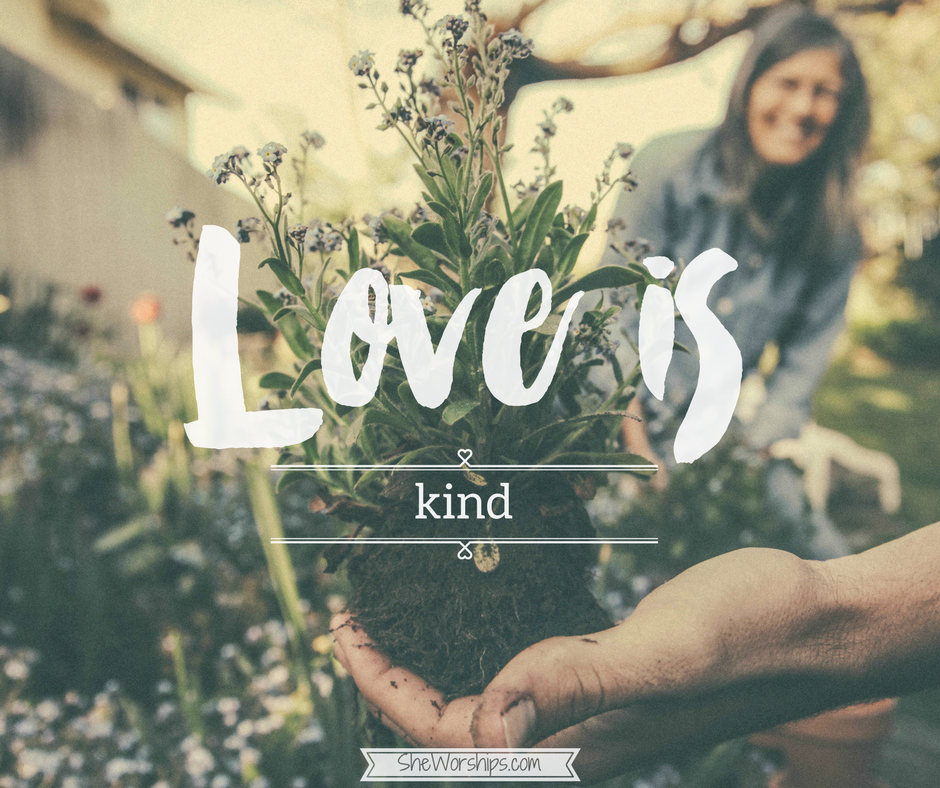
“Love is kind.”
1 Corinthians 13:4
Love is a funny thing. We tend to know it when we see it, but it’s also a bit like jello, tough to pin to the wall. Love means a lot of different things in our world, which is why it sometimes gets wrangled into unloving agendas. We can do selfish things, reckless things, and self-destructive things, all in the name of “love.”
It’s not hard to pick apart the more shallow notions of love, but today’s post is not about that. Instead, I want to look at our good faith efforts at love. This message is for those of you who consider yourself a kind, loving person. Everyone likes you. Everyone gets along with you. You aren’t the type to have enemies. You are “nice” and “sweet” and, from the outside, it looks like you’ve got this love thing down. You are, by all appearances, a kind individual.
I like to think of myself that way. I like for people to think I’m nice. However, the last few years have taught me something important about myself, which is that “nice” is not the same as “kind.”
What I have learned is that “nice” wears the veneer of kindness, but it is not a true fruit of the Spirit. While niceness and kindness might look the same, their goals are completely different. Kindness is motivated by love for others, but niceness is motivated by self.
In his book Love Kindness, Barry H. Corey has a great way of making this distinction. He writes,
“Whereas aggression has a firm center and hard edges, niceness has soft edges and a spongy center. Niceness may be pleasant, but it lacks conviction. It has no soul. Niceness trims its sails to prevailing cultural winds and wanders aimlessly, standing for nothing and thereby falling for everything.”
Kindness, on the other hand, has “a firm center with soft edges.”
To put it another way, kindness has conviction. It has courage. It has a solid backbone. And those are precisely the components necessary to endure in love, even when rejected and mistreated. Niceness, on the other hand, buckles in the face of conflict. It retreats from the prospect of adversity. Kindness doesn’t revel in those things, but it does have the fortitude to persevere in love, in spite of them.
I say all this as a self-described nice girl. I like to be liked. It’s one of my chief idols. I hate when people dislike me. Mean blog comments ruin my day. If I suspect someone is annoyed with me, I obsess over it. My peace of mind is deeply connected to being accepted, which means I bend easily to fear. Sometimes I won’t write the thing I should, because I’m afraid it will offend people. I’m afraid my readers won’t like it, or will misunderstand me, and that prevents me from speaking the truth in love.
That, I have come to realize, is not kindness. It’s cowardice.
One of the easiest ways to diagnose niceness in ourselves, is to pay attention when someone rebuffs our kindness. Maybe they weren’t grateful, or they were rude, or they ignored the gesture altogether, but how did it make you feel? Were you indignant? Were you mad that they didn’t appreciate you? Or did you let it go, because the point was never to be liked? How you process rudeness and ingratitude is the difference between kind and nice.
In her own reflections on kindness, author Emily Freeman wrote this:
“[Kindness] means being approachable, listening with intention, seeking service rather than power.
It means being willing to lock arms with people with whom we disagree for the sake of love without compromising our convictions or feeling responsible to change their minds.
It means a warm meal, a soft word, a high five, an offer to help, and an unwavering willingness to be rejected.
Sometimes it means listening before we speak and other times it means speaking up with confidence and facing the consequences, however uncomfortable they might be.
It always means being aware of the presence of Jesus in every moment.”
The word “kind” means “deliberately doing good to others,” but it comes from the word “kin,” as in family. The kind person loves everyone like family, choosing love rather than suspicion, and showing warmth and welcome rather than defensiveness. Like family–which knows us better than anyone else–true kindness is authentic rather than surface-level.
And nobody did this better than Jesus, who was not always nice, but was the definition of kind.
In a cultural moment packed with name-calling, mud slinging, and division, we need Jesus’ brand of kindness. Kindness is gentle but bright, the picture of “salt and light,” so it’s no wonder the Enemy has tricked us into settling for nice. Nice pats us on the back for not being mean, but it also deters us from speaking up when we should, or it falls apart at the first sign of friction.
The world doesn’t need more judgment, self-righteousness, or rage, but it doesn’t need more niceness either. It needs love with open arms and a spine. It needs kindness, which is how the world will know us.
(This is the second post in a series on love. You can read the first one here)
Sharon
Sharon





Sharon, I really appreciate your point of view here. I would definitely describe myself as nice, and I can see the lack of conviction in that now! I’ve been struggling with feeling like none of my friends are that close but I think a lot of that has to do with me putting on that nice polite front and not really being kind with conviction from my heart for their good. I really have been loving everything I read from you!
Beth thank you!!
I so relate. Lord, help me be kind!
This one hit me square in the eyes: In the best way. Thanks for sharing!!!
I’ve always found it off-putting when others describe me as “nice”, and it took me a long time to realize the reason, which is exactly what you articulate here: that my niceness lacks a backbone and courage and is approval-seeking–it’s not kind. Thank you for expressing this so eloquently – and renewing my prayer that my heart moves toward kindness.